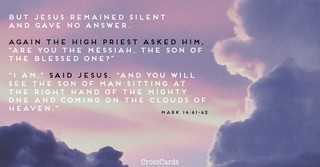Change Translation
- Recent Translations
- All Translations
Mark 14:56
Share
Listen to Mark 14:56
Settings
Scripture Text Size
56
for though many gave false testimony against Him, their statements did not tally.
Mark 14:56 Meaning and Commentary
Mark 14:56
FOOTNOTES:
F12 T. Bab. Sanhedrin, fol. 30. 1. Maimon. Hilch. Eduth, c. 4. sect. 1.
For many bare false witness against him
The word "false", is not expressed in the Syriac, Persic, and Ethiopic versions: which only signify, that they bore witness against him, accused him of, and laid many things to his charge:
but their witness agreed not together;
which showed it to be false, and so not to be admitted; for witnesses were to be as one in their testimony, or not to be received: the, rules concerning them with the Jews, are these F12;
``the tradition is, for ever let not their testimony be joined together, unless they both see, (dxak) , "as one": says R. Joshua ben Korcha, even one after another; and their testimony is not ratified in the council, until they both witness "as one".''Though this is not much the sense of the passage here; it was not the falsehood of their testimony, which this council was unconcerned about, or the contradiction that was in it, which does not appear; but their testimonies were not, (isai) , "equal", or answerable to the wishes of the council; they were not sufficient to prove a capital crime upon him, in order to, put him to death, which was what they wanted: they only respected some light and trivial matters, and did not amount to a charge of blasphemy, or sedition.
F12 T. Bab. Sanhedrin, fol. 30. 1. Maimon. Hilch. Eduth, c. 4. sect. 1.
Taken from John Gill's Exposition of the Bible
Unlock Deeper Insights: Get Over 20 Commentaries with Plus! Subscribe Now
Mark 14:56 In-Context
54
Peter followed Jesus at a distance, as far as the outer court of the High Priest's palace. But there he remained sitting among the officers, and warming himself by the fire.
55
Meanwhile the High Priests and the entire Sanhedrin were endeavouring to get evidence against Jesus in order to put Him to death, but could find none;
56
for though many gave false testimony against Him, their statements did not tally.
57
Then some came forward as witnesses and falsely declared,
58
"We have heard him say, `I will pull down this Sanctuary built by human hands, and three days afterwards I will erect another built without hands.'"
The Weymouth New Testament is in the public domain.
